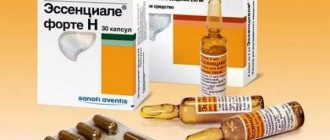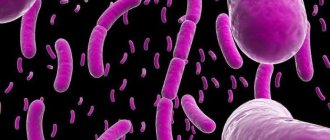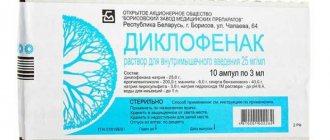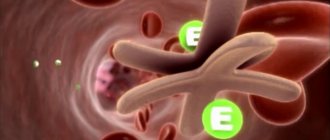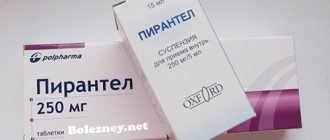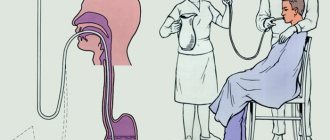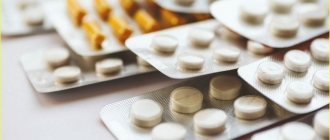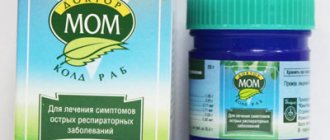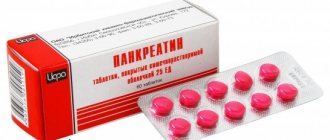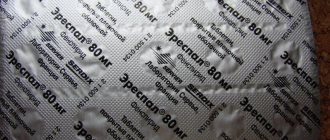General description of the drug
The drug, the main active ingredient of which is nitrofurantoin, is a tablet used in therapy in children for the treatment of urinary tract infections caused by streptococci, staphylococci and other pathogenic microorganisms.
The drug has high bioavailability and is excreted from the body primarily by the kidneys. The medication is indicated for use for the following disorders:
The medicine can also be prescribed for preventive purposes, after diagnostic studies or surgery.
Furadonin's instructions for use for children contain the following information:
Patients under 12 years of age take the medicine at the rate of 5-7 mg per kilogram of body weight. Divide the resulting amount into four doses. A child over 12 years old takes 100 mg twice a day.
The course of treatment for cystitis is from five to seven days. For other pathologies, the adjustment of the therapy period is determined by a specialist. During treatment, it is necessary to maintain a drinking regime, since the medicine should be taken with plenty of liquid. You should also drink as much water as possible throughout the day.
It is important to organize a drinking regime
Description of the drug
The bactericidal medicine is available in tablet form. The tablets have a characteristic yellow color, sometimes with a greenish tint.
The medicine is also produced in the form of a suspension. For cystitis, adults are recommended to use uroantiseptic in tablet form.
Nitrofurantoin is the main active substance, which is a derivative of nitrofurans. One tablet contains 50 mg (Furadonin Avexima) or 100 mg of the active ingredient.
Furadonin is a uroantiseptic with an antimicrobial effect. Directly used as a remedy for urinary tract infections, including cystitis. It starts to work from the first dose.
Analogs
This drug has no structural analogues. But there are a number of drugs that are similar in the mechanics of their therapeutic effects. These include the drugs Furamag, Furagin, Furasol, Furazidin.
Furazolidone, which doctors often prescribe for the treatment of cystitis, is not considered an analogue of Furadonin. It contains a different active ingredient and acts completely differently.
Another good drug for quickly treating cystitis is Levomycetin. It is an antibiotic and has shown itself well in the treatment of acute cystitis. Experts prescribe Furosemide as a diuretic to remove bacteria from the bladder.
Positive and negative reviews about the treatment
Patients' opinions about the drug are mostly positive. Everyone notes the rapid effectiveness of “Furadonin” in the treatment of cystitis. Judging by the reviews, relief occurs within 30-60 minutes after administration. You can purchase the medicine in almost every pharmacy from different manufacturing companies at a very affordable price (from 50 rubles for 10 tablets, 85 rubles for a pack of 20 pieces). The drug is available with a prescription.
In their responses, many note the occurrence of side effects. They mainly relate to the digestive system: stomach pain, nausea, vomiting. More often, such reactions are typical for young girls of slight build with poor appetite. All undesirable consequences are individual and occur in most cases due to violation of dosage instructions. For example, the drug should not be taken on an empty stomach. The correct dose is an excellent prevention of complications.
"Furadonin" is an effective and cheap remedy for the treatment of cystitis. By following all the rules of administration, the risk of side effects can be significantly reduced. The acute form, thanks to regular and timely use of the drug, does not become chronic.
Treatment of cystitis and causes
Cystitis is considered a common disease of the urinary system. For the most part, it occurs in women, since the wide and short urethra creates comfortable conditions for pathogenic microflora to penetrate through it.
In men and children, cystitis is much less common. The age category for which cystitis is diagnosed is women 18-40 years old.
During this period, they have an active sex life, which is a provoking factor for the development of the disease.
Bacterial cystitis is a common form of bladder inflammation. This is due to the fact that in the development of this disease there are several routes and mechanisms of infection.
There is an increase in urination, which is due to the sensitivity of the inflamed mucous membrane of the bladder.
In addition to antibiotics, patients are prescribed the following groups of pharmacological drugs and treatment methods:
- Diuretics. Treatment for cystitis involves the use of agents that stimulate urine production. The use of herbal remedies or chemical therapeutic agents is permitted. Among chemotherapy drugs, Furosemide is considered a representative. This drug increases urine production within half an hour after administration. The main representative of herbal remedies is rose hip tea.
- Anti-inflammatory. To relieve symptoms that arise due to the inflammatory process, medications that have an anti-inflammatory effect are used.
- Physiotherapy. Prescribing physiotherapeutic procedures only during convalescence (recovery). Electrophoresis, UV irradiation, UHF help speed up the process of regeneration of affected tissues, and also prevent the formation of structural changes in the wall of the bladder.
Description and effect of the drug
Some people wonder if Furadonin is an antibiotic?
Belongs to the group of nitrofuran derivatives, which are considered antibiotics. These drugs have an antibacterial effect and are used for the treatment and prevention of bacterial pathologies.
It has a bactericidal effect on a list of microorganisms, including gram-positive and gram-negative pathogens.
The effectiveness of the drug against the following groups of bacteria has been proven:
- staphylococci;
- shigella;
- coli;
- Proteus.
The effectiveness of the drug may be reduced. This is due to the fact that pathogenic microorganisms develop resistance to antibacterial agents.
An improvement in the condition is noted already 12 hours after the first dose. The peculiarity of the drug is that it is partially excreted unchanged by the kidneys, acting on bacteria directly in the lumen of the urinary tract.
Therefore, Furadonin is used more often for diseases of the bladder, urethra and kidneys.
Women should have tablets for cystitis with them, as the disease manifests itself at any time.
Dosage for children and adults instructions
How to take Furadonin? As for adults, the drug should be taken 1 tablet 4 times a day immediately before meals. Be sure to drink plenty of water for a faster effect. At the initial stage of cystitis, the medicine can be used 3 times a day.
Instructions for use for children include taking Furadonin 2 tablets per day, which should be divided into 4 times. During the treatment of this disease with Furadonin, it is necessary to consume protein foods as much as possible. This will help the drug have a more effective effect on the body.
This medicine is widely used in the treatment of both chronic and acute forms of cystitis. It is also used as a prophylactic agent.
Furadonin during pregnancy
During pregnancy, a woman becomes more vulnerable to the development of many diseases, one of which may be cystitis. After all, pregnant women have a significantly reduced immune system.
Many pregnant women are interested in the question: Is Furadonin an antibiotic or not? It is a very effective anti-inflammatory agent that helps eliminate infections. A wide range of effects on harmful microorganisms means that it is an antibiotic. Therefore, it is contraindicated for pregnant women, especially in the early stages. Although Furadonin is not the most toxic drug, its active substances are still able to penetrate the placenta and negatively affect the development of the unborn baby.
But practice shows that some pregnant women still resort to using this drug. This happens only after a microbiological examination of urine, which determines sensitivity to the drug.
As for women during lactation, this treatment is strictly contraindicated for a nursing mother. This is due to the penetration of Furadonin into mother’s milk, the active ingredients of which negatively affect the infant, affecting the gastrointestinal tract.
Side effects
This drug can cause the following ailments during its therapeutic effect on the body:
- regular migraines and dizziness;
- disorders of the gastrointestinal tract;
- nausea leading to vomiting;
- cough and other respiratory system disorders;
- allergic rashes on the skin;
- fever and chills.
If these symptoms appear during treatment, it is better to consult a doctor. He may prescribe a reduced dosage of the drug.
Contraindications for use
There are a number of contraindications to treatment with Furadrnin, namely:
- individual intolerance or hypersensitivity to some components of the drug;
- chronic hepatitis of any degree;
- liver dysfunction;
- pregnancy and lactation;
- children's age up to 1 year.
People with diabetes and anemia should use this drug with caution.
Furadonin's analogs
On the modern pharmacological market there are a number of similar drugs, both in their effect on the disease and in the price category. The most common ones are:
- Urofuragin. It is used for acute and chronic infectious diseases of the genitourinary system, as well as for the prevention of these ailments.
- Furagin. An effective remedy for the treatment of diseases such as urethritis, pyelonephritis, cystitis, prostatitis. Used for rehabilitation after operations of the genitourinary system.
- Furamag. It is an effective remedy for severe infectious and inflammatory processes of the urinary tract, as well as infected burns.
Regardless of which drug is used to treat cystitis, you must first consult with a specialist.
Pharmacological action and pharmacokinetics
Absorption of Furadonnin occurs in the stomach, and its breakdown occurs in the liver. The bioavailability of the drug is 50%. Moreover, eating food increases this indicator significantly.
The drug is excreted in the urine (about 50% in unchanged form). It is thanks to this property that the drug is one of the most effective in treating diseases of the urinary system. The binding of the drug to plasma proteins is 60%.
The drug can penetrate the placenta and can be excreted in breast milk.
Effect of the drug
Taking the drug in tablet form orally allows the active substances to be rapidly absorbed after administration in the intestinal cavity within 3-4 hours. Then its active ingredient Nitrofurantoin enters the lymphatic channels, blocking the spread of infection through the lymphogenous route. The medicine acts directly on the enzymes of microbial cells that transport hydrogen molecules. In this case, the metabolic processes occurring in bacteria are disrupted, which leads to the complete destruction of pathogenic microorganisms.
Since furadonin has antiseptic properties, it can promote wound healing and help in the treatment of lesions in internal organs.
Description of Furadonin
Furadonin (nitrofurantoin) belongs to the group of nitrofurans, synthetic antibacterial agents that are actively used in medical practice.
Their clinical effectiveness is inferior to antibiotics, but they are indispensable when treatment of infectious diseases of the urinary tract, acute intestinal infections, trichomoniasis, and giardiasis is required. This group also includes furatsilin, furagin, furazolidone, furazolin. During treatment with nitrofurans, it is important to adhere to the scheme and regimen. The next dose of medicine should be taken strictly at a certain time. Streptococcal infection requires special discipline from the patient. Be sure to visit your doctor if there is no improvement after a week of treatment or if additional symptoms appear.
While using the medications and for 4 days after stopping them, you should not drink alcoholic beverages. It is necessary to exclude from the diet foods that contain tyramine, namely: cheeses, beer, wine, beans and smoked meats. This medicine must not be combined with cough and cold medications.
When taking Furadonin and Furagin, the urine turns yellowish and brownish.
The medicine is intended mainly for the treatment of urinary tract infections. The properties of Furadonin are due to its ability to disrupt the synthesis of protein molecules in the bacterial cell. The drug is active against staphylococci, streptococci, Shigella, Escherichia, Proteus and a number of other microorganisms.
Furadonin is well absorbed from the gastrointestinal tract. Penetrates through the blood-brain barrier (into brain tissue), the placenta and is able to be excreted in breast milk.
The antibacterial effectiveness of the drug "Furadonin" is achieved due to its ability to disrupt the synthesis (growth) of protein molecules in bacteria. The product is effective against both gram-positive and gram-negative bacteria: streptococci, staphylococci, Shigella, Proteus, Escherichia and many other microorganisms.
Limitations and side effects
It is undesirable to use the drug for the treatment of cystitis in elderly people and patients with diabetes mellitus. It should not be combined with alcoholic beverages or foods containing tyramine (smoked meats, cheese, legumes and dishes made from them).
Contraindications:
- Individual intolerance, risk of an allergic reaction;
- Kidney failure;
- Severe cardiovascular insufficiency;
- Chronic hepatitis, liver cirrhosis;
- Acute porphyria.
Furadonin penetrates the placental barrier and into milk during lactation, so it is not used in the treatment of cystitis in pregnant and lactating women, replacing it with other agents.
Side effects of the drug:
- Allergies – Quincke's edema, skin rash;
- Disturbances in the gastrointestinal tract - vomiting, nausea, discomfort, and occasionally diarrhea;
- Disturbances in the functioning of the respiratory system - cough, asthmatic attacks in patients with bronchial asthma, chest pain;
- Disturbances in the functioning of the nervous system – headache, dizziness;
- Dermatitis;
- Superinfection of the urinary tract;
- Arthralgia.
Despite the risk of side effects, Furadonin is actively used in urological practice.
This is due to a large number of advantages - accessibility, low resistance of pathogenic microorganisms, gentle effects on the microflora of the digestive tract and vagina in women, preservation of local and general immunity.
Share this post
▲ error: Who's here?
Side effects
In some cases, patients may experience side effects when treated with medications. These include:
- allergies, which can manifest themselves in different ways (this includes angioedema, skin rash, etc.);
- breathing problems;
- changes in stool and nausea, which may result in vomiting;
- drowsiness;
- violation of orientation in space;
- migraine;
- disruption of the hematopoietic process;
- fever;
- pain in joints and muscles.
If any adverse reactions occur, the patient should immediately inform the doctor.
Compatibility with other medications
Some medications can reduce the medicinal effects of Furadonin, so they should not be taken together. In addition, they can increase the concentration of the antimicrobial agent, which can lead to overdose and adverse consequences. Such drugs include:
- antacids, as well as those that reduce stomach acidity;
- fluoroquinolone antibiotics;
- Phenylbutazone;
- Sulfinpyrazone and Probenecid.
A too acidic environment in the bladder can also lead to increased effects of nitrofuran on the body, so it is advisable to eat as many foods as possible that contain protein.
Analogs and price
The average price of Furadonin Avexim (50 mg tablets No. 10) in Moscow is 80 rubles. Dispensed by prescription.
It must be stored in a dry place, protected from light and out of reach of children, at a temperature not exceeding 25°C. Shelf life – 4 years.
The price of Furadonin is about 120 rubles per pack of 10 pieces. But it may vary slightly depending on the pharmacy.
As for the reviews about the drug, they are mostly positive, patients and doctors claim that Furadonin quickly and effectively fights bacteria that provoke inflammation of the urinary system. When used correctly, improvements in health can be noticed within a few days of starting to take the drug. After 7-10 days the disease completely recedes.
In the end, as a result, it should be noted that in addition to all the positive qualities that the drug Furadonin has, it has a number of contraindications and precautions. In order not to harm your body, you should never self-medicate.
At the first symptoms of inflammation of the urinary system, you must definitely visit a medical institution, where a specialist will examine you, refer you for tests, conduct diagnostics and confirm or deny inflammation of the urinary system. Only a doctor can prescribe a drug that will not bring negative consequences.
There are no structural analogues of Furadonin. There are a number of analogues of this drug according to the mechanism of therapeutic effect. These are the drugs Furasol, Furagin, Furazidin, Furamag.
Furagin belongs to the same group (nitrofuran derivatives). The indications for use of both drugs are similar, and at the same time they provoke the development of almost identical side effects. It is generally accepted that Furagin is a milder medicine. But the final decision on the choice of drug should be made only by a specialist, which requires consultation with a doctor.
Composition of the drug
Furadonin is available in the form of tablets, the active component of which is nitrofurantoin. Excipients of the drug are:
- silica;
- potato starch;
- calcium stearate.
This medicine can be purchased at any pharmacy without a prescription. The cost of the drug in Russia is on average 100 rubles. As for Ukraine, the price in this country varies within 70 UAH.
Application of medicine
Furadonin is an effective antibacterial and antimicrobial drug. Therefore, it has a beneficial effect on recovery. It is used not only for cystitis, but also for the following diseases:
- urethritis;
- pyelonephritis;
- complications after surgical intervention in the genitourinary system.
Eliminates harmful microorganisms such as streptococci, staphylococci, and E. coli. Therefore, Furadonin is one of the most effective drugs for infectious and inflammatory diseases of the genitourinary system.
Composition and properties
Furadonin is an antimicrobial drug from the nitrofuran group that is used to treat diseases of the urinary system. The indication for taking the drug is not only cystitis of bacterial origin, but also urethritis, pyelitis, pyelonephritis. The drug can also be prescribed as a prophylaxis after surgery on the urinary system or after a diagnostic procedure.
Furadonin is not an antibiotic. The active substance of the drug is nitrofurantoin; this active substance disrupts protein synthesis in bacteria and also disrupts the permeability of the cytoplasmic membrane. As a result, bacteria begin to multiply more slowly and the infection goes away.
The drug is used specifically for cystitis, because it accumulates in the urine, and is also active against such microbes that most often provoke the inflammatory process of the genitourinary system:
- Streptococci;
- Staphylococcus;
- Klebsielaa,
- E. coli, etc.
Of course, many other microbes, even fungi, can provoke diseases, so Furadonin should be prescribed after an examination. First you need to make sure that the pathogens are sensitive to the drug.
Method of administration, dose and course of treatment
Cystitis is an inflammatory process that develops in the mucous membrane of the bladder, resulting from infection (bacteria, viruses, fungi) and decreased immunity due to diabetes, pregnancy, breastfeeding, taking hormonal or cytostatic (antitumor) drugs, and radiation sickness.
Relapses of cystitis are a fairly common phenomenon. Frequent constipation, intestinal dysbiosis (caused by infection), and gynecological diseases contribute to the re-development of the disease. Hypothermia is the most common cause of recurrent cystitis. Stress and general fatigue of the body reduce its protective properties. Artificial termination of pregnancy has an extremely negative effect on the genitourinary system.
Cystitis is a problem familiar to many women. Therefore, the question of how to take furadonin for cystitis is always relevant. The effectiveness of the drug in the treatment of cystitis depends on the test results, the sensitivity of the pathogenic flora, the form of the disease, and the individual characteristics of the body.
The complex of tests for cystitis includes:
- general urine analysis (with a clear predominance of leukocytes, the presence of red blood cells and a small amount of protein);
- urine analysis according to Nechiporenko (with a detailed determination of the number of leukocytes, red blood cells and cylinders);
- bacteriological urine culture (to determine the pathogen and the effectiveness of the antimicrobial effect of the drug);
- analysis for sexually transmitted diseases;
- flora smear;
- Ultrasound of organs located in the pelvis.
An acute form of inflammation of the bladder is treated in a dosage of 50 to 100 mg 4 times a day, dividing the dose into equal periods of time. The duration of treatment is determined by the doctor and depends on many indicators. The uncomplicated form is usually cured within 7–10 days. Patients with chronic cystitis require maintenance doses of the drug.
During therapy, doctors recommend that patients follow certain rules; they advise:
- take tablets a few minutes before meals;
- drink with a small amount of water.
By combining medication with food intake, you can reduce the risk of developing unnecessary effects from the gastrointestinal tract. You can take the tablets not only with water, but also with other drinks; the following are considered a bad choice:
- alcohol;
- caffeine and drinks containing it;
- juice of sour berries and fruits (which can affect the acidity of urine);
- milk.
If the drug was prescribed to a patient for the treatment of pyelonephritis, then it is worth limiting the amount of protein consumed. That is, refuse completely or partially food of animal origin.
For adults, the optimal dosage is 50–100 mg, but not more than 600 mg per day (provided that the dose is divided into 3–4 times).
For the treatment of chronic diseases, the optimal dosage is 1–2 mg per 1 kg of weight.
Since nitrofurantoin penetrates the placental barrier and affects breast milk and the lactation period, tablets are not prescribed during pregnancy or breastfeeding. Because they can cause serious harm to the child’s body.
For children
It is advisable that the dose of Furadonin be calculated by a urologist on an individual basis. But if this is impossible for one reason or another, then you should use a simple scheme:
- take the child’s weight and the permissible dose of the drug; per 1 kg of weight you will need 5–8 mg;
- the resulting amount should be divided into 4 doses;
- As a result, it will be possible to obtain the optimal dose for treating the child.
Rules for using the medicine
When starting treatment with furadonin, the patient must make sure in what cases the use of the drug is indicated.
Medical professionals prescribe furadonin in the following cases:
- treatment of genitourinary infections such as cystitis, pyelonephritis, pyelitis and urethritis;
- therapy for chronic bladder pathology;
- preventive measure during urological and gynecological examinations (cystoscopy, catheterization, minimally invasive urological operations).
Before using the drug, it is necessary to consult a specialist who will select an individual treatment regimen.
Different dosages of furadonin require taking into account age characteristics, features of pathology and the cause of the disease.
In order to calculate how to take a single dose of the drug, you need to remember that 5-8 mg is indicated per 1 kg of body weight. Then everything is simple: for example, your weight is 62 kg, you must multiply it by 8 mg and divide by 100. The result is 4.96 mg. – this is your single dose. Considering that the tablets contain 50 - 100 mg, then at one time you are advised to take 1 tablet of 50 mg or half of 100 mg of furadonin.
In the instructions for use for cystitis, there are methods of administration calculated by doctors:
- adults (over 18 years old) 1-2 tablets three times;
- children over 12 years old, 1-2 tablets 2 times a day;
- for children under 12 years of age, take ½ tablet four times.
- pregnant women from the 13th week: 0.1-0.5 mg four times a day.
The duration of the course is on average 1-2 weeks and depends on the attending physician.
The dosage of medications and the duration of the course also depend on the stage of the disease:
- Acute cystitis is treated for up to 10 days. Take 50 mg of furadonin every 6 hours (for adults).
- Chronic inflammation of the urinary system, cystitis, can be treated with a one-time dose of 50-100 mg of nitrofurate. Individual, long-term therapy (up to 3 months) is prescribed by a doctor.
- To prevent relapses, take 100 mg of the drug at night.
To treat cystitis with furadonin in women and men, in the first three days of the disease, take four times 100 mg of the drug. Timely treatment started after the first dose of the medicine reduces pain and normalizes urination, acting instantly.
It is mandatory to consult your doctor before starting to take furadonin. If a course of treatment has been started, then you should take furadonin responsibly, trying not to miss taking the drug and keeping the same time interval. Do not take two doses at the same time to avoid side effects.
Pregnant women should use the medicine with extreme caution, as fetal intoxication is possible. When taking nitrofurate during lactation, refrain from breastfeeding.
Take furadonin tablets with plenty of water. During the treatment period, it is recommended to increase the amount of drinking.
The drug begins to act actively, showing a therapeutic effect, after two to three days.
How to take Furadonin for cystitis in adults
Furadonin is primarily a drug for adult patients. Furadonin Avexima can be taken by patients from the age of six, but it is mainly prescribed to patients over 18 years of age.
Furadonin for cystitis should be taken until the symptoms of the pathology completely disappear and for some time after. This is done in order to completely eliminate the remainder of living pathogenic microflora, which can trigger a relapse.
Doctors recommend taking Furadonin for various diseases in a certain dosage. It is best to take tablets of the drug during meals, and wash them down with a whole glass of boiled warm water. Since in many patients cystitis becomes chronic, which is more difficult to cope with, the duration of taking Furadonin is extended.
Correctly taking Furadonin for chronic cystitis should be once a day, but the dosage depends on the doctor’s recommendation. The doctor will prescribe 50 or 100 mg of the drug for a patient to take for chronic cystitis. If there is a need to treat cystitis in children, Furadonin should be taken in pediatric doses.
In case of severe pathology, doctors can prolong the tablets for the treatment of cystitis - patients will be advised to treat with Furadonin not for seven, but for ten days. The time of admission is determined by the severity of the pathology.
When Furadonin is taken as a prophylaxis, it usually does not take more than three to four days. The doctor will advise how many Furadonin tablets to take depending on the severity of the pathology and the patient’s condition.
If the patient has repeated attacks of infectious pathology, and they occur in a severe form, then adults are recommended to take Furadonin for cystitis in a double dosage - 100 mg of the drug four times a day. If ineffective, replace the drug with Nolitsin for cystitis - this drug also fights pathogenic microflora.
Furadonin for children with cystitis is calculated using the formula 3 mg per kilogram of weight per day. As a maintenance therapy, Furadonin for the prevention of cystitis is reduced by three times - this is enough to provide the desired effect.
If you need to take Furadonin Avexim as a prophylaxis, then it is recommended to take four tablets of the drug on the day of the manipulation, and also take one tablet for another three days to maintain the preventive effect.
Instructions for use for cystitis
The drug Furadonin belongs to the nitrofuran group of antibacterial drugs. The instructions for Furadonin for cystitis contain data that the main active ingredient is nitrofurantoin. In addition, each tablet contains additional substances - starch, calcium stearate and aerosil. The tablets are round in shape and yellow or greenish in color. Available in dosages of 50 and 100 mg of active ingredient. The method of administration of Furadonin is oral administration.
The main use of the drug Furadonin is the treatment of inflammatory pathologies of the urinary organs. Doctors recommend using Furadonin for cystitis, urethritis, pyelonephritis, pyelitis, and bacteriuria. Doctors also prescribe Furadonin for prophylaxis during urological examinations, manipulations, and in preparation for surgery.
Like any drug, Furadonin has contraindications. Instructions for use of Furadonin for cystitis prohibit the following patients from taking the medicine:
- core patients with grade 3-4 failure;
- people suffering from liver and kidney pathologies;
- children under six years old;
- pregnant women and women during lactation;
- patients allergic to nitrofurantoin.
In rare cases, the drug may cause side effects in patients. The instructions for tablets for cystitis Furadonin notes that this may be nausea, headache, allergic rash, abnormalities in the blood count, chest pain, severe skin reactions. If a patient with a pathology of the urinary organs starts taking Furadonin for cystitis and side effects appear, then the drug is discontinued.
The price of Furadonin is not high; this medicine can be bought for 85-90 rubles. The price is lower in online pharmacies, so you can go to the websites of the relevant companies.
Advantages of furadonin over other antibiotics
When treated with furadonin, like furagin, the body’s overall immunological resistance is not inhibited, as often happens when taking antibiotics. Consumption of nitrofurates, on the contrary, increases the degree of immunity. This occurs due to the activation of the process of phagocytic activity of leukocyte bodies. The drug also helps to increase the complementary binding characteristics of blood serum and the absorption-adsorption capacity of the RES of the spleen and liver.
In addition, strains of pathogenic microorganisms practically do not develop resistance to the active substances of furadonin, as often happens with other types of antibiotics.
Furadonin can be successfully used both for re-treatment and to prevent relapses.
Cautions and Important Instructions
In some pathologies, taking the drug may be ineffective or have a depressing effect.
Negative reactions
Side effects may occur as a result of the active substance.
From the nervous system: drowsiness, headache, dizziness, insomnia, blurred vision, in rare cases, polyneuropathy develops.
From the digestive system: nausea, vomiting, diarrhea, constipation, abdominal pain, heartburn, decreased or loss of appetite, pancreatitis, pseudomembranous enterocolitis, cholestatic jaundice, rarely hepatitis.
From the respiratory system: chest pain, cough, shortness of breath, pulmonary infiltrative changes (interstitial pneumonitis, pulmonary fibrosis), eosinophilia, bronchospasm.
In the circulatory system: leukopenia, granulocytopenia, agranulocytosis, thrombocytopenia, hemolytic anemia, megaloblastic anemia (these changes are reversible).
Allergic reactions (most often in the form of dermatological manifestations): urticaria, Quincke's edema, itching and skin rashes, malignant exudative erythema, exfoliative dermatitis, extremely rarely - anaphylaxis.
Other effects: change in urine color to bright yellow, malaise, drug fever, joint pain (arthralgia), lupus-like syndrome, flu-like symptoms, genitourinary tract infection (in most cases caused by Pseudomonas aeruginosa).
Special notes and recommendations
The drug may slow down psychomotor reactions. It should be taken with caution when driving or performing other activities that require increased concentration.
Correct intake will help minimize the risk of side effects - during or after meals, drinking milk, with plenty of liquid (the likelihood of digestive disorders is reduced).
If undesirable reactions occur, you should immediately stop taking the drug, drink plenty of fluids (to eliminate toxins in the urine) and consult a doctor.
"Furadonin" is not used in the treatment of purulent paranephritis, prostatitis and diseases of the renal cortex.
Overdose
In case of an overdose of the drug, headache, dizziness, nausea, vomiting, and allergic manifestations are observed. If such signs appear, you should stop taking the drug. Effective first aid methods in such a situation: drink as much fluid as possible (increases excretion), rinse the stomach, perform hemodialysis, and carry out symptomatic treatment.
Complex therapy
Use the drug in parallel with other drugs with caution. The instructions exclude the following combinations:
- The use of Furadonin and drugs from the fluoroquinolone group is unacceptable.
- Nalidixic acid and antacids with magnesium trisilicate reduce the antibacterial effect (due to low absorption).
- Uricosuric agents (sulfpyrazone, probenecid) reduce the concentration of the active substance in the urine, which impairs therapeutic efficacy, and increase toxicity (high serum levels).
- Carbonic anhydrase inhibitors and agents that cause urine alkalinization reduce the antibacterial properties of the drug.
- The drug reduces the absorption of estrogen and neutralizes the effectiveness of taking estrogen-containing contraceptives.
- The oral typhus vaccine is not active when taking the drug.
Drinking alcohol during treatment with Furadonin is strictly contraindicated.
When, to whom and why
The answer to these three questions should be of primary interest to patients. After all, the success of the upcoming treatment depends on them.
When - that is, there are indications.
- urethritis of infectious origin (inflammatory processes in the urinary canal);
- cystitis caused by pathogenic or conditionally pathogenic microflora (inflammatory processes in the bladder);
- pyelonephritis (inflammation of the kidneys);
- for preventive purposes after surgical interventions, endoscopic manipulations and catheterization of seriously ill patients.
Who should not take these tablets or other forms of medicine - that is, contraindications.
- intolerance to any of the components of the drug - common to all drugs;
- chronic renal failure;
- severe heart pathologies;
- chronic hepatitis and cirrhosis;
- children under 3 years old - for tablets;
- for children under 1 month - for suspension;
- pregnancy and lactation period.
- nausea and vomiting, loss of appetite, diarrhea;
- allergic reactions in the form of rash, itching, chills, in especially severe cases - Quincke's edema;
- breathing problems - shortness of breath, cough, pain in the chest area;
- dizziness, drowsiness, decreased concentration.
Less common are the appearance of drug fever, anaphylaxis and some other manifestations. If any of these symptoms are detected, you should immediately stop taking the drug and consult your doctor. In case of acute manifestations, measures are taken to eliminate the negative consequences and another medicine is prescribed.
Now regarding the “why”. Furadonin should not be used during pregnancy, as it penetrates the placenta and can cause disturbances in the development of the fetus. During breastfeeding, it affects the quality of breast milk - the baby may experience allergic reactions and stool disturbances.
It is also not recommended to drive or engage in work that requires extreme concentration. In adults, absent-mindedness is often observed, especially with maximum doses and a long course of use of tablets.
special instructions
The instructions for the drug do not indicate anything about its compatibility with alcohol. However, in the presence of infectious and inflammatory processes in the organs of the urinary system, drinking alcohol is not recommended. This can significantly increase the stress on the kidneys.
Furadonin is strictly contraindicated in severe renal and liver dysfunction.
Using the drug simultaneously with nalidixic acid, antacids, and drugs with magnesium trisilicate reduces the effectiveness of the former.
It is strictly forbidden to combine the drug with fluoroquinolones.
The effect of the drug is significantly reduced if the patient takes drugs that block tubular secretion. Also in this case, the risk of intoxication of the body increases.
In order to increase the effectiveness of the drug, patients must adhere to a special protein diet at the time of treatment. Ideally, it should be compiled by the attending physician.
During pregnancy and breastfeeding
Furadonin can pass through the placenta and negatively affect the fetus. So its use by pregnant women is not recommended. However, doctors in some cases prescribe the medicine to women after 12 weeks of pregnancy. Such treatment is prescribed only in a critical situation, when the probable risks to the fetus are comparable to the therapeutic effect of using the drug.
Possible consequences of taking the medicine for the unborn child:
- the appearance of hemolytic anemia;
- intrauterine development disorder.
Since taking the drug with food improves its absorption, it is better for pregnant women to drink Furadonin not during meals.
Furadonin should not be used during lactation, because its substance passes into mother's milk. If the situation develops in such a way that it is impossible to refuse taking the medicine, then the woman who drinks Furadonin will have to wean the child from the breast for the duration of therapy. The drug is eliminated from the body very quickly, so that after completion of treatment, breastfeeding can be resumed.
Indications for use of Furadonin
According to the instructions, Furadonin is contraindicated for:
- pregnancy, lactation;
- liver cirrhosis;
- up to 1 month of age;
- chronic hepatitis;
- acute porphyria;
- chronic heart failure;
- hypersensitivity to nitrofurantoin;
- chronic renal failure;
- deficiency of glucose-6-phosphate dehydrogenase.
When taking the medicine, your muscles, chest, and head may ache. Insomnia, increased sweating, nausea, heartburn, and loss of appetite are possible. Side effects can rarely manifest themselves in the form of diarrhea, pain in the lower abdomen, and redness on the skin.
Manifestations of allergies due to Furadonin: skin rashes causing itching, chills, shortness of breath, cough. Most often, those who suffer from diabetes experience dysfunction of peripheral nerves and inflammatory processes in the pancreas.
If such symptoms occur after consuming Furadonin, you should consult your doctor. To protect yourself from various types of discomfort, you should take the tablets with food or immediately after eating, and drink enough liquid. It is recommended to take a test to see if there is any individual intolerance to the drug.
Like any medicine, Furadonin has a number of contraindications. Who and when should not drink Furadonin:
- pregnant women in the first 12 weeks (expectant mothers at other stages can only do so under the supervision of a doctor), as anemia may occur in the fetus;
- nursing mothers (Furadonin will be present in breast milk);
- infants up to 1 month;
- when driving a car or other activities where concentration of attention is necessary (after taking the drug it makes you sleepy);
- for acute or chronic renal failure, chronic heart disease, hepatitis, cirrhosis of the liver;
- in case of individual intolerance to the drug.
Elderly people should take the drug with caution. During treatment, drinking alcoholic beverages is prohibited! To prevent digestive system upset, it is better to take the tablets with meals or drink milk.
After taking Furadonin, you need to drink more fluid.
The use of Furadonin is contraindicated for:
- Chronic renal failure;
- Chronic hepatitis;
- Liver cirrhosis;
- Chronic heart failure;
- Glucose-6-phosphate dehydrogenase deficiency;
- Porphyria;
- Lactation (breastfeeding), during pregnancy, children under 1 month.
The drug "Furadonin" is not prescribed in the following situations:
- chronic renal failure;
- chronic hepatitis;
- cirrhosis of the liver;
- chronic heart failure;
- acute porphyria;
- age up to 1 month;
- pregnancy, breastfeeding.
The following contraindications to the use of the drug are determined:
- high sensitivity to the drug;
- chronic renal failure;
- chronic heart failure of the second or third degree;
- cirrhosis of the liver;
- acute porphyria;
- hepatitis in chronic form.
Also contraindications to taking Furadonin are the period of pregnancy and lactation, the age of the child under 1 month.
Instructions
Compound
The main substance in it is nitrofurantoin. The drug also contains calcium stearate, colloidal silicon dioxide and starch.
pharmachologic effect
This is an antimicrobial drug. Its bactericidal effect occurs through the process of protein binding in bacterial cells and membrane permeability in cells. Furadonin is effective against a wide range of bacteria. It has proven itself well in the treatment of genitourinary tract infections.
The most pronounced activity is observed in acidic urine. The bactericidal effect decreases slightly if the urine pH is 8 or more.
Pharmacodynamics and pharmacokinetics
The active component of the drug is absorbed from the stomach. Its bioavailability is 50%. Taking the drug with food improves bioavailability. Metabolism occurs in muscles and liver. The half-life of the drug occurs within 20-25 minutes. Nitrofurantoin can pass through the placenta and enter the mother's milk. It is excreted from the body through the kidneys.
Indications for use
The instructions for this medicine contain the following recommendations for use:
infectious inflammation of the urinary system; prevention of infection during examinations and surgical interventions on the urinary tract.
Contraindications
- high sensitivity to drug substances;
- heart failure and renal;
- cirrhosis of the liver;
- hepatitis;
- acute porphyria.
This medicine is not prescribed for the treatment of glomerulonephritis
The drug should be used with extreme caution:
- with vitamin B deficiency;
- in case of disturbances in electrolyte balance;
- with anemia;
- with diabetes mellitus.
https://youtube.com/watch?v=nTs_-6ydu2s
Side effects
Some side effects may occur during therapy:
- allergic reactions;
- cough, chest pain, decreased respiratory function;
- nausea, vomiting, diarrhea;
- dizziness, drowsiness;
- leukopenia, granulocytopenia, thrombocytopenia, anemia;
- dermatitis, erythema multiforme;
- anaphylaxis, arthralgia, myalgia.
If any negative effects occur, you should immediately visit a doctor.
Overdose
In case of an overdose of the medicine, vomiting begins. In this situation, it is recommended to drink large amounts of fluid and perform dialysis.
Interaction with other drugs
You should not take Furadonin and medications at the same time - antacids with magnesium trisilicate and nalidixic acid. This will reduce the antibacterial effect of the drug.
You should also avoid combining Furadonin with fluoroquinolones.
Doctors do not recommend taking this drug together with medications that block tubular secretion, since a decrease in the content of nitrofuratoin in the urine makes the effect on bacteria weaker. The concentration of nitrofuratoin in the blood increases, this makes the medicine toxic.
Sulfinpyrazone and probenecid can reduce the process of removing the drug from the body. So these tablets should also not be taken together with Furadonin.
Nitroxoline in combination with Furadonin leads to an increased negative effect on the nervous system. Therefore, you should not use these drugs together.
You can purchase the drug in pharmacies only with a prescription written by a doctor.
Storage requirements
Furadonin tablets for cystitis, as well as powder and suspension, should be stored in a dry place and at a temperature of no more than +25 degrees.
special instructions
It is necessary to stop taking the medication when the first symptoms of neuropathy appear, since this complication is life-threatening. Also, treatment should be suspended if signs of dysfunction of the liver, lungs, or neurological disorders are detected.
In patients who drink Furadonin, false positive reactions may occur when measuring sugar levels in the urine.
Side effects from the gastrointestinal tract will not be so obvious if the medicine is taken with food, or if its dose is reduced.
Furadonin is contraindicated for children under 6 years of age. This medicine should not be used in the treatment of paranephritis with purulent complications and prostatitis.
The drug may cause drowsiness and dizziness, so you should avoid driving or operating machinery while taking it.
These tablets should not be prescribed together with medications that cause changes in kidney function.
Interaction with other drugs
| A drug | Compound | Price, rubles |
| Furagin | Furazidin | 150 |
| Urofuragin | Furazidin | 350 |
| Furamag | Furazidin | 520 |
| Furasol | Furazidin | 520 |
Patients clarify which is better for cystitis - Furagin or Furadonin. The drugs belong to the nitrofurans, so their mechanism of action and indications are similar. But Furagin is considered a remedy that has milder side effects, since it belongs to the latest generation. According to statistics, Furagin and Furamag are more often recommended in childhood to avoid unpleasant effects.
In most cases, reviews about the drug are positive.
Furadonin is the drug of first choice for patients with inflammatory and infectious processes in the urinary tract. According to my observations, their unpleasant symptoms of the disease disappear after 1-2 days of treatment with this drug. However, I do not recommend self-medication. Before taking the drug, you need to consult a specialist.
Zhukov V.M. doctor
Furadonin is a very effective drug for the treatment of diseases of the urinary system. Full recovery usually occurs within a week after the start of therapy. However, this drug can cause dizziness and drowsiness, so I do not recommend it for patients whose work requires increased attention and reaction.
Oberemok L.D., doctor
For a long time I suffered from chronic cystitis. Exacerbations usually occurred after hypothermia or with decreased immunity. In this case, the urologist recommended Furadonin to me. This drug helped get rid of the unpleasant symptoms of the disease in the shortest possible time. No relapses were observed after this.
Larisa, 28
I had to take the drug for kidney inflammation. In this regard, it turned out to be quite effective. Unfortunately, throughout the course of therapy I was bothered by nausea. Despite this, I recommend the medicine.
Mikhail, 38
This morning I woke up and felt a nagging pain in my lower back. The doctor diagnosed kidney inflammation and prescribed Furadonin. I found it at the first pharmacy, I was pleasantly surprised by the price. The product turned out to be very effective and helped already on the 3rd day of treatment. I recommend to everyone.
Tatiana, 51
Just 2 days after treatment with Furadonin, my symptoms of cystitis completely disappeared, and I stopped taking the medication. However, the disease soon returned again. In this case, I started treatment with the drug again, but had already completed the full course. After this there were no relapses. For this reason, I do not recommend ending treatment early.
Natalia, 44
Throughout the entire period of treatment with Furadonin, I felt nauseated. However, I have noticed that the unpleasant side effect is much less severe if I eat well. I recommend that patients eat small meals every 2-3 hours. It is better to give preference to white meat and fish. Also in this case, drinking plenty of fluids, tea with mint and ginger will help. It is better to drink the drug with milk, and take it immediately after a heavy meal.
Valery, 64
When taking Furadonin simultaneously with medications that contain nalidixic acid or antacids, you should take into account that its therapeutic effect is reduced.
You should pay attention to the compatibility of Furadonin with other drugs
The drug should not be taken together with fluoroquinolones, as they are completely incompatible.
Medicines that are designed to block tubular secretion also cannot be used simultaneously with nitrofupran, since they not only reduce its effect, but also increase toxicity.
During the treatment period, you need to drink plenty of fluids, excluding mineral water and caffeine-containing drinks. You should also stop drinking alcohol in any form at this point. Drinks of this kind reduce the effectiveness and increase the toxicity of the medication.
DETAILS: Sinuforte for sinusitis: instructions for use, reviews of the drug
To increase the therapeutic effect during treatment of the disease with a nitrofuran drug, you should adhere to a special diet that excludes fried, very salty, sweet and fatty foods.
Since the medication sometimes reduces reactivity, it is recommended to refrain from driving any vehicle during therapy.
During treatment, urine acquires a deep orange color, which is due to the action of the active drug substance. After discontinuation of the drug, urine takes on its previous appearance.
Release form and types
Furadonin is recommended by urologists for the treatment of the following diseases:
- acute cystitis and other inflammations in the genitourinary system, which is often recorded in young women and older women;
- repeated exacerbations of inflammation, which occur in 10% of women as a result of unsuccessful treatment of acute cystitis, and rarely occur in men;
- for the purpose of prevention before the procedure of cystoscopy (examination of the bladder using a cystoscope), urological surgical operations, catheterization.
Nitrofurantoin as an active substance has an effect on gram-positive and gram-negative types of bacteria:
- Staphylococcus aureus;
- streptococcus;
- coli;
- enterobacteria;
- shigella;
- Klebsiella
It also has little activity against enterococci and fungi of the genus Candida.
When the medicine is taken orally, within 3-4 hours it is rapidly absorbed into the intestinal cavity. Nitrofurantoin passes into the lymphatic channels and prevents the process of infection through the lymph.
Furadonin is available in several forms:
- tablets 20 pcs. dosage 0.05 g;
- tablets 20 pcs. dosage of 0.1 g;
- tablets for children (dissolve in the intestines) 30 pcs. dosage 0.03 g;
- suspension (spoons and measuring cup included).
- Tablets 0.05 g, 20 pieces per package.
- Tablets 0.1 g, 20 pieces per package.
- Tablets 0.03 g, soluble in the intestines, 30 pieces per package (for children).
- Furadonin suspension (a measuring cup or spoon is included in the package for dosing).
Cost and storage conditions
The drug has a low price. It can be purchased in pharmacies for 42-110 rubles. The cost depends on the amount of the drug and the content of the active substance in it.
Available without a prescription.
The storage conditions for Furadonin Avexim state that the drug should be kept indoors at a temperature not exceeding 25 degrees Celsius, in a dry and dark place. Access to the drug for children should be limited to avoid accidents.
The shelf life is 48 months; after its expiration, the product cannot be used.
Efficacy of the drug in men
Urological recommendations do not recommend the use of Furadonin for cystitis in men due to its possible connection with inflammation of prostate tissue. As we remember, it does not reach therapeutic concentrations in prostate tissue.
To date, although there are many randomized trials that included male patients, baseline demographic data have not been disclosed and results have not been stratified by gender. Thus, the pharmacological effectiveness of Furadonin in men cannot be assessed.
Use of the product by children
According to the instructions for use of Furadonin, doses are prescribed at 4 or 6 mg per 1000 g of weight per 24 hours. The daily dosage should be divided into 4 parts and taken after meals with plenty of water. For long-term treatment, it is recommended to use a dosage of 1 mg per 1000 g of weight once every 24 hours.
When treating cystitis, the drug is prescribed by a pediatrician. He also individually calculates the dosage, duration of treatment and daily requirement. "Furadonin Avexima" helps with acute and chronic forms.
During the entire treatment, it is better to eat protein foods. This is due to the fact that the medicine has a better effect on the body in an acidic environment.
For what diseases is it prescribed?
Furadonin® is widely used in urological and gynecological practice. The antiseptic eliminates inflammatory processes localized in the bladder, kidneys and urethra. It is prescribed after surgical interventions, as well as after cystoscopy and installation of a catheter in the bladder. Furadonin® is an indispensable medicine in anti-relapse and preventive treatment. The drug is indicated for inflammation of the mucous membrane of the renal pelvis, bladder and urethra. Furadonin® is also used in veterinary practice.
Are there any contraindications?
The drug should not be used for severe kidney disease. These include chronic hepatitis, liver cirrhosis and acute porphyria. Another factor is the development of heart failure of degrees 2 and 3. The drug should not be used in case of kidney failure or hypersensitivity to nitrofuran derivatives.
The tablet form of the drug is well tolerated by most patients. However, there are minor side effects such as vomiting. It goes away quickly after drinking a small amount of liquid.
Instructions for use indicate more serious side effects. These include allergic reactions, which are expressed by itching, rash on the body and cough. From the gastrointestinal tract, in addition to the previously mentioned vomiting, diarrhea and loss of appetite may occur. There is a possibility of headaches and dizziness. The patient's condition may be drowsy and weakness develops. In some cases, the composition of the blood changes. This manifests itself in anemia, decreased levels of white blood cells and platelets. If such manifestations occur, you must immediately stop taking Furadonin and visit a doctor.
Reviews
Galina, 43 years old Several weeks ago I felt sharp pain in the lower abdomen while urinating. It turned out that it was cystitis. At the appointment, the therapist prescribed Furadonin. Already on the second day, the pain almost disappeared, but the doctor warned that it was necessary to complete the course, even if all the symptoms disappeared. A week passed and there was no trace of cystitis left. Despite the negative reviews on the Internet about Furadonin, I experienced absolutely no side effects.
Elizaveta, 37 years old, I have been using Furadonin for cystitis for several years now. Very pleased. This year, in the summer, the doctor advised me to drink it also as a preventive measure before the autumn cold. The dosage is very small, but the autumn passed without endless trips to the toilet and taking antibiotics.
Lyudmila Ivanovna, 53 years old In the spring, my feet got wet and the very next day cystitis began. Antibiotics are not suitable for me due to allergies that have developed with age. The doctor prescribed Furadonin tablets produced by Avexim, warning about side effects. But, after 3 days, I already forgot about the pain in the bladder, and I did not notice any negative manifestations. The undoubted advantage is the speed of treatment and recovery.
Anastasia, 30 years old I started having cystitis for the first time in my life. Because of such pain, I immediately ran to the doctor, who recommended this remedy. When I went to the pharmacy, I was pleasantly surprised by the low price. I started taking the medicine, and in addition to the pain from cystitis, I also added constant nausea, and then dizziness. I felt terrible. At the follow-up appointment, the doctor stopped Furadonin and prescribed a course of antibiotics. I will never use this product again.
Spilled
Among analogues replacing furadonin, it is worth noting an effective herbal preparation called Prolit. It has anti-inflammatory, diuretic, antispasmodic effects, and is capable of crushing and removing small stones from the body. Such properties are provided by the curly silkworm included in the composition.
Kidney tea "Prolit"
Kidney tea enhances the separation of chlorides and urea, making the drug effective against cystitis, urethritis, and kidney diseases. Phyllanthus niruri provides a diuretic effect while simultaneously loosening kidney stones. Sow thistle helps cope with bladder inflammation. Papaya fruits are able to dissolve small stones in the liver and normalize the secretion of the gastrointestinal tract.
The drug has few contraindications. Prolit is not prescribed to pregnant women, people with sensitivity to the components of the drug and children. The recommended dosage is 5 pills three times a day. Drink plenty of water. Course duration is from 3 to 6 weeks.
Furazolidone or Furadonin
The drugs differ in their mechanism of action and active components. Furadonin is an antimicrobial agent and is used to treat urological pathologies. Furazolidone is an auxiliary medicine in the complex treatment of cystitis.
Furazolidone is an antibacterial agent of the nitrofuran group. Contains the active ingredient – furazolidone 50 mg. It has pronounced activity against gram-negative aerobic microorganisms. Less effective against gram-positive aerobes.
The antimicrobial effect of the drug is based on the ability of the nitro group of the active component to be reduced to an amino group under the influence of bacterial enzymes. Has immunostimulating properties. Increases the phagocytic activity of leukocytes, reduces the production of toxins by microorganisms.
Indications for use: infectious diseases of the genitourinary system, gastrointestinal tract, skin. Prescribed in the complex therapy of cystitis, trichomonas infections, vaginitis, urethritis, pyelitis. Effective for bacillary dysentery, typhoid, paratyphoid, infectious diarrhea. Suitable for treating patients with infected wounds and burns. Directions for use: orally, after meals. The dosage depends on the severity of the disease state and the age of the patient, and is therefore determined by the attending physician. Side effects: nausea, vomiting, diarrhea, pain in the epigastric region, allergic reactions. For treatment, drinking large amounts of water, taking antihistamines and B vitamins is indicated. Contraindications: hypersensitivity to the components of the drug, end-stage chronic renal failure. Not prescribed for patients younger than 1 month, with glucose-6-phosphate dehydrogenase deficiency and lactase deficiency
It is prescribed with extreme caution during pregnancy and lactation, for patients with impaired renal function, liver and central nervous system diseases. Overdose: polyneuritis, toxic liver damage. For treatment, gastric lavage, saline laxatives and enterosorbents are indicated.
Measures are also recommended to maintain water and electrolyte balance.
Release form: tablets for oral administration, rectal and vaginal suppositories.
Contraindications
Furadonin is excreted primarily by the kidneys, so conditions in which there are disturbances in the excretory function of this organ (acute and chronic renal failure, pathology of the zona glomerulosa, glomerulonephritis, etc.) are direct contraindications to the use of the drug. This may lead to a decrease in the therapeutic effect due to insufficient presence of the active substance in the urine and an increased risk of developing serious side effects due to high concentrations of the substance in the blood.
Direct contraindications also include:
- allergic reactions to the components of the drug;
- period of pregnancy and lactation (the drug penetrates the placenta and is also present in breast milk);
- heart failure;
- some liver diseases (cirrhosis, hepatitis);
- oliguria and porphyria.
Furadonin should be used with caution in patients:
- with systemic diseases (for example, diabetes mellitus);
- with a deficiency of B vitamins;
- with anemia;
- in conditions causing electrolyte imbalance.
People with such pathologies have a significantly increased risk of peripheral neuropathy.
Furadonin tablets are prohibited for use in children under 3 years of age. In this case, the drug is prescribed in the form of a suspension or other medications are included in the therapy.
Furadonin is not used for purulent lesions of the renal cortex, as well as prostatitis.
For children
Tablets can be prescribed to children older than 1 month. This drug is prohibited for children under this age. The dosage is calculated as follows: 5-7 mg per 1 kilogram of the child’s body weight per day. This daily dose should be divided into 4 doses. Children over 12 years of age are recommended to take 100 mg per dose a couple of times a day. Treatment is carried out within a week.
A small child may not like the bitter taste of the tablet, so it is better to give him a suspension. To prepare it, the drug can be diluted in milk or juice.
In infants, taking this medication may cause hemolysis of red blood cells. To prevent such a complication, it is recommended to give the child vitamin E while taking the medication.
Negative opinions
There are also negative reviews. For cystitis, “Furadonin”, in principle, as some believe, can be taken, since it is quite effective, but many people are frightened by its strong side effects, which some of them have experienced. Among them are nausea, severe headaches and pain in the stomach area, dizziness. Moreover, negative symptoms directly depend on the frequency of use of the medicine. The more often people used it, the worse they felt. Many people associate this phenomenon with the high toxicity of the drug. And they note that you need to be careful with this medicine. And if possible, they advise choosing a more gentle remedy.
In general, the medicine has proven itself well. Nevertheless, in order not to harm, but to help yourself get rid of cystitis, you need to follow one rule: the medicine should be prescribed only by a doctor, and the course of treatment should be at least seven days.
Mechanism of action of furadonin
The active ingredient of the drug is nitrofurantoin, a derivative of nitrofuran. It is highly effective against bacteria that cause cystitis (Escherichia coli, Staphylococcus saprophyticus, Shigella sonnei, etc.).
These microorganisms have not yet acquired pronounced resistance to this antibiotic. However, the drug is not effective against certain strains of bacteria (Proteus, Serratia), which in rare cases (5-10%) can also cause cystitis.
Furadonin treats cystitis due to its high bactericidal and bacteriostatic activity. It is well absorbed from the gastrointestinal tract and excreted from the body by the kidneys.
Indications
It has already been mentioned that the remedy helps fight many problems caused by infectious agents. Now, let's see what Furadonin helps with. An infection that forms in the intestines can eventually spread to the urinary tract. Usually such manifestations end in inflammation of the bladder. This is where a product containing nitrofurantoin comes to the rescue. Indications for the use of Furadonin are the following diseases:
- cystitis;
- urethritis;
- pyelonephritis;
- pyelitis.
The good thing about the drug is that it can be taken both for acute and chronic diseases. It also has beneficial effects on the kidneys and urethra. Because of these properties, the drug is also used in veterinary medicine.
The drug may be prescribed for other urological problems not related to infection. It is also prescribed for prophylactic purposes to avoid serious complications during interventions in the urinary organs. This includes various types of examinations, urological operations and catheterization.
What else does Furadonin help with? In addition to its main actions, it accelerates the healing process of tissues of the genitourinary system in case of damage. The drug also increases their protective functions.
Main characteristics
"Furadonin Avexima" is an antimicrobial drug produced by pharmaceutical companies in Russia.
The medicine contains the active component nitrofurantoin, and each tablet also contains additional components - calcium stearate, starch, silicon dioxide.
Manufacturers suggest using tablets, as well as nitrofurantoin in powder or suspension form.
Adults choose the first option for administration, and children are given a suspension or powder. Packages contain 12-50 50 mg tablets - convenient if short-term or long-term therapy is required.
The active ingredient of the drug belongs to the nitrofuran group. Has a pronounced antimicrobial effect.
Nitrofurantoin is capable of disrupting the process of protein synthesis in the pathogen's body, increasing membrane permeability and prompt death of the pathogenic microorganism.
The drug is active against pathogenic microbiota - gram-positive and gram-negative microorganisms.
Such dangerous pathogens that nitrofurantoin neutralizes include streptococci, E. coli, staphylococci, shigella and many others.
Doctors consider it justified for use in patients suffering from infections of the urinary system.
Nitrofurantoin manifests itself in acidic urine; when the pH rises above 8, the activity of the drug decreases.
Despite the fact that Furadonin Avexima does not belong to the group of antibacterial drugs, it still eliminates pathogenic microflora from the body of a sick person. Used as a remedy for cystitis.
When taken, the drug is absorbed in the gastrointestinal tract; it is better to take the tablets with food, food improves the bioavailability of the drug.
Nitrofurantoin binds to plasma proteins, and the drug is metabolized in the liver and muscles.
The drug can break the blood-brain barrier, penetrate into breast milk and through the placenta. The drug is evacuated by the kidneys, half comes out unchanged.
Furazidin
The drug has a pronounced antimicrobial effect. Available in tablet or powder form. It is a component of many drugs of the nitrofuran group. The therapeutic effect of furazidin is based on disruption of the synthesis of nucleic acids in microorganisms, inhibition of biochemical processes in harmful agents, which leads to the destruction of the membranes of pathogenic cells.
The drug is prescribed for cystitis, pyelonephritis, urethritis, and gynecological infections. Contraindications are allergies to nitrofurans, severe kidney disease, pregnancy, and lactation. Children are only allowed to take this medicine if they are over 4 years of age.
It is recommended to use the drug with extreme caution if you have diseases of the nervous system, liver, or kidneys. Side effects may include dyspepsia, dizziness, headaches, polyneuritis, allergic rashes on the skin surface
Furadonin or analogues which is better
All drugs included in the nitrofuran group have very similar medicinal properties, indications for use, contraindications and side effects. Almost equally effective against diseases associated with the urinary system. They have a similar effect on gram-positive and gram-negative microorganisms, without causing addiction. The prescription of a particular drug is carried out after a thorough examination and identification of intolerance to any component in the composition of the drug. The decision on what to replace Furadonin with can only be made by a doctor. If different patients have similar symptoms of diseases of the genitourinary organs, they may be prescribed different medications depending on the individual characteristics of the body.
Due to the incompatibility of drugs in this group with ethyl alcohol, alcohol consumption should be avoided during treatment. Acting gently and quickly, the effect of taking Furadonin and its analogues is observed after just a few pills.
Furadonin and alcohol
When taking Furadonin, drinking alcohol is prohibited. Combining the drug with alcoholic beverages can lead to negative consequences.
The drug, when interacting with alcohol, leads to tachycardia and shortness of breath. The presence of ethanol in the blood negatively affects human health. Therefore, you can use the medicine only after completion of therapy.
Alcohol has a strong diuretic effect, so it will quickly remove the drug from the body, preventing it from destroying the pathogenic microbes that caused the development of the disease.
Furasol
Another analogue replacing Furadonin with a powerful antiseptic effect. It is used to treat infectious and inflammatory diseases of the genitourinary area, as well as burns, conjunctivitis as an external remedy.
The drug "Furasol"
Release form: tablets or powder from which the solution is prepared. The role of the active substance in the composition of the drug is played by furagin, which is active against various types of microorganisms and resistant strains. Taking the medicine leads to an increase in leukocytes and an increase in their phagocytic activity.
Furasol is contraindicated for people who are highly sensitive to the furagin contained in it, for allergic dermatitis, during pregnancy, breastfeeding, and for children under 4 years of age. Side effects are extremely rare. They are expressed mainly in the form of an allergic reaction and headache. Such phenomena can be prevented by combining the drug with B vitamins, antihistamines, and drinking plenty of water.
In acute forms of cystitis, Furasol solution is prescribed for douching and washing. Prepare it immediately before use by diluting a packet of powder in a glass of hot water. The procedure is performed 4 times a day. The duration of the course is at least 3 days.
Clinical effectiveness
It was previously said that the drug is well absorbed and is eliminated from the body relatively quickly. During use of the medicine, its concentration reaches insignificant levels. For this reason, the drug dissolves well in a variety of liquids, so if you have dark urine while using Furadonin, you should not be alarmed.
The drug copes well not only with the previously mentioned pathogens, but also with other groups of infectious bacteria. The product effectively eliminates the following strains:
- Gram-negative aerobes.
- Enterococci.
- Gram-positive aerobes.
- Staphylococcus aureus type.
Furadonin is available in the form of small tablets that are yellow in color. They have a bitter taste. The product will easily eliminate many bacteria that cause cystitis. The drug can be used as a preventative measure.
Advantages
Furadonin for cystitis Modern pharmacology has a wide range of drugs indicated in the treatment of inflammation of the genitourinary tract.
Long-term studies and patient reviews prove the effectiveness of furadonin for cystitis.
The advantages of the drug include:
- unlike antibiotics (amoxicillin) does not suppress the immune system;
- nitrofurantoin, which is the active ingredient of furadonin, disrupts the protein synthesis of pathogenic microorganisms and simultaneously activates leukocyte activity;
- positive effect on the adsorption abilities of the liver and spleen, improving the binding properties of blood;
- The recommended dosage of furadonin is not addictive;
- a small dose of medication settles in the blood, unlike antibiotics; no adaptation of bacteria to nitrofuran was observed in the treatment of cystitis and other urinary infections, which allows repeated use of the drug even in case of relapses;
- has no structural analogues;
- available to everyone without exception due to the optimal price-quality ratio; few side effects and contraindications compared to antibacterial agents for the treatment of cystitis;
- treatment of children older than 1 month is possible; simultaneous rapid bacteriostatic and bactericidal effects. The above advantages of the drug make it possible to use it to treat people with a sufficient number of chronic diseases.
Drug interactions
It is not recommended to combine Furadonin with nalidixic acid and antacids. The presence of magnesium trisilicate in them reduces the absorption of Furadonin, and its effectiveness in treatment also decreases.
Taking the drug with Sulfinpyrazone and Probenecid is also not indicated, since it is possible to reduce the excretion of Furadonin in the urine.
This can lead to an increase in the concentration of the drug in the blood, an increase in its toxic effect and a decrease in the therapeutic effect.
It is not recommended to take Furadonin and Nevigramon together, as the effect of Furadonin will decrease. Avoid simultaneous use of Furadonin with drugs that may adversely affect renal function.
An alkaline environment reduces the effect of Furadonin, so it should not be compatible with medications that increase urine pH.
It is not recommended to take Furadonin in parallel with Sulfinpyrazone and probenecid.
Drinking alcohol while undergoing treatment with Furadonin is prohibited.
